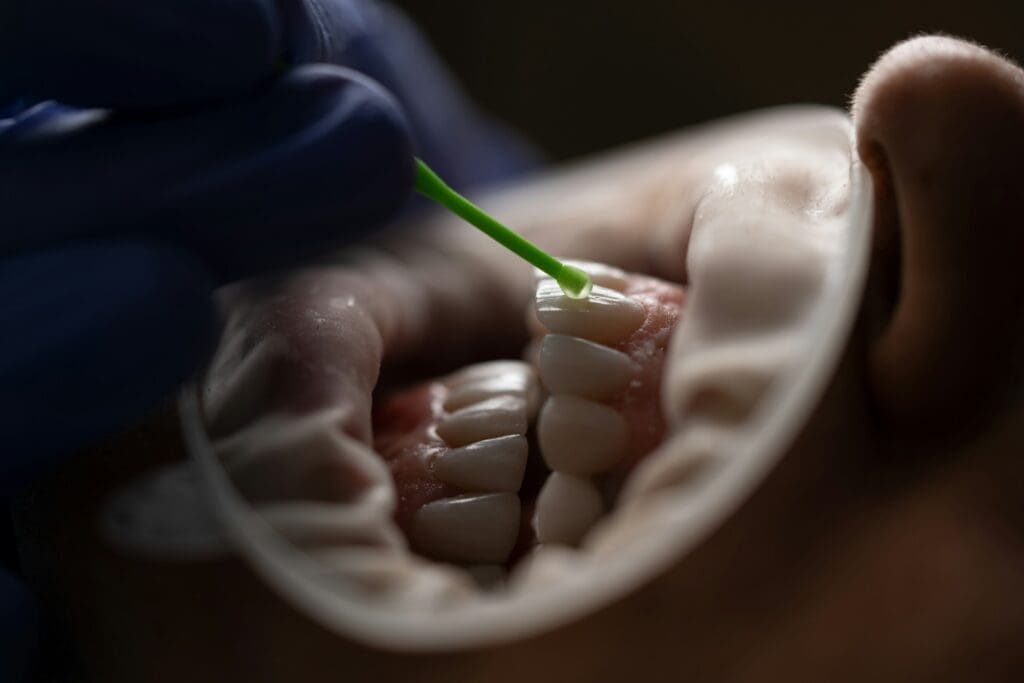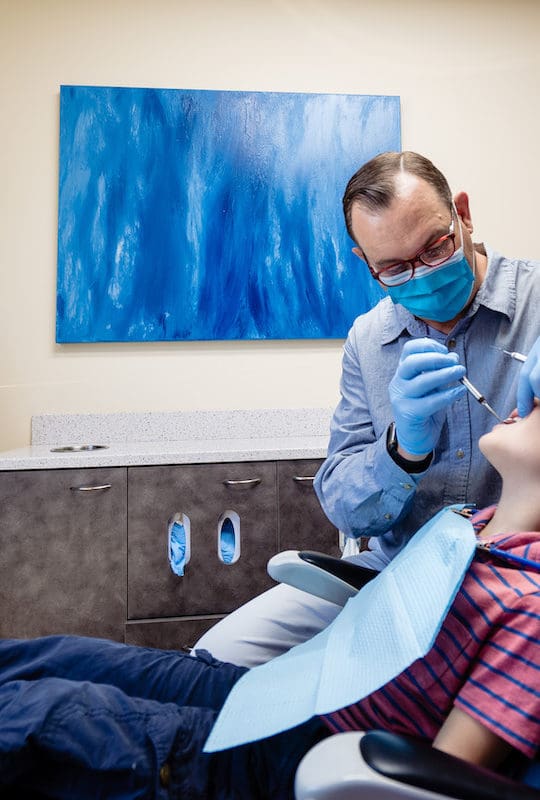
“Soft teeth” is a term often used to describe weakened or easily damaged teeth, but it’s not a recognized medical condition. The idea that some people are born with “soft teeth” is a common myth. In reality, weakened teeth are usually the result of enamel erosion caused by factors like poor oral hygiene, diet, and certain medical conditions. Genetics can play a role in enamel strength, but they are not the sole determinant of tooth health. Maintaining strong teeth involves good oral care practices, a balanced diet, and regular dental check-ups.
Table of Contents
Are "Soft Teeth" a Real Condition?
The term “soft teeth” is often used to describe teeth that seem more susceptible to cavities, chipping, or decay. However, “soft teeth” is not a real medical diagnosis. The idea that some people are born with naturally soft teeth is actually a myth. In reality, teeth do not become “soft” but can be weakened due to enamel erosion.
Enamel erosion can happen due to several factors, such as poor oral hygiene, frequent consumption of sugary or acidic foods, or lack of fluoride. These factors can cause the enamel—the hard, protective outer layer of your teeth—to wear down, making the teeth more prone to damage. It’s important to note that while genetics may influence the thickness or mineral composition of enamel, they do not make teeth inherently “soft.”
Understanding that “soft teeth” is not a true medical condition helps clarify that most people can maintain strong, healthy teeth with proper care. Adopting good oral hygiene practices, using fluoride products, and maintaining regular dental visits can help protect and strengthen enamel, preventing the issues often associated with the myth of “soft teeth.”
5 Common Myths About Soft Teeth
- Myth 1: Some People Are Born with Soft Teeth A popular misconception is that some individuals are naturally born with “soft teeth.” In reality, teeth are not soft by nature. However, factors like genetics can slightly influence enamel thickness or mineral content, but they don’t cause teeth to be “soft.”
- Myth 2: Cavities Are Caused Solely by Soft Teeth Many believe cavities are solely due to “soft teeth,” but they’re actually caused by poor oral hygiene, high sugar intake, and acid-producing bacteria that erode the enamel over time.
- Myth 3: Weak Teeth Are Unavoidable People often think weak teeth are inevitable if their parents had dental problems. While genetics can play a role, habits like good oral hygiene, fluoride use, and a balanced diet have a far greater impact on tooth strength.
- Myth 4: Diet Has No Effect on Tooth Strength Contrary to this myth, what you eat significantly affects your teeth. Sugary, acidic foods weaken enamel, while calcium-rich foods help to strengthen it.
- Myth 5: Brushing Harder Will Make Teeth Stronger Brushing too hard can actually wear down enamel and cause gum recession. Using a soft-bristled toothbrush and gentle brushing techniques is much better for maintaining healthy, strong teeth.
By debunking these myths, it becomes clear that strong, healthy teeth are more about good care and smart choices than natural predisposition.

What Causes Teeth to Become Weak or "Soft"?
- Enamel Erosion Enamel erosion is a leading cause of weakened teeth. The enamel, the hard outer layer of your teeth, can wear down due to frequent exposure to acidic substances. Acidic foods and drinks, such as citrus fruits, soda, and sports drinks, soften the enamel, making it easier to erode over time. This erosion reduces the tooth’s protective barrier, leaving it more susceptible to decay, sensitivity, and damage.
- Tooth Decay Tooth decay is another common factor contributing to weakened teeth. When plaque, a sticky film of bacteria, accumulates on the teeth, it produces acids that attack the enamel. Consuming sugary foods and drinks feeds these bacteria, leading to cavities. If left untreated, decay can penetrate deeper layers of the tooth, weakening its structure and potentially leading to infections or tooth loss.
- Genetics While not a direct cause of “soft teeth,” genetics can influence several factors that affect tooth strength, such as enamel thickness, tooth size, and susceptibility to cavities. Some people may have inherited a thinner enamel or more porous teeth, making them more vulnerable to decay and wear. However, genetic predisposition does not guarantee weak teeth; good oral hygiene practices and regular dental care can help mitigate these risks.
- Dietary Habits Your diet plays a crucial role in your dental health. Frequent consumption of sugary and starchy foods fuels the bacteria that cause plaque, increasing the risk of tooth decay. Acidic foods and drinks can wear away the enamel, while calcium-rich foods like dairy, leafy greens, and almonds help strengthen it. A balanced diet that includes plenty of fruits, vegetables, and water can help protect your teeth from becoming weak.
- Neglecting Dental Care Poor dental hygiene is a major contributor to weakened teeth. Skipping regular brushing and flossing allows plaque to build up, leading to cavities, gum disease, and enamel erosion. Regular dental check-ups are vital for catching early signs of decay or gum disease and maintaining strong, healthy teeth.
By understanding these causes, you can take proactive steps to protect your teeth, maintain strong enamel, and prevent the issues often associated with “soft teeth.”
How to Strengthen Your Teeth and Protect Enamel?
- Use Fluoride Treatments Regularly
Fluoride is essential for tooth health; it strengthens enamel and helps prevent cavities. Choose a fluoride toothpaste and mouthwash to use daily. Your dentist may also recommend professional fluoride treatments, especially if you’re at a higher risk for tooth decay. - Practice Proper Brushing Techniques
Brushing your teeth twice a day is crucial, but how you brush matters too. Use a soft-bristled toothbrush and gentle, circular motions to clean all surfaces of your teeth. Avoid brushing too hard, as this can wear down the enamel. - Floss Every Day
Flossing is a must for removing food particles and plaque between teeth, where your toothbrush can’t reach. Daily flossing prevents decay and gum disease, both of which can weaken teeth over time. Make it a habit to floss at least once a day, preferably before bedtime. - Rinse After Meals
Rinsing your mouth with water after eating can help neutralize acids and wash away food particles that contribute to enamel erosion. This is particularly important after consuming acidic or sugary foods and drinks, which can attack the enamel. - Reduce Sugary and Acidic Foods
Limit your intake of sugary and acidic foods and beverages, like sodas, candies, and citrus fruits. These can erode enamel over time. If you do consume them, try to drink water or brush your teeth soon afterward to reduce their impact. - Stay Hydrated with Water
Drinking plenty of water throughout the day helps wash away food particles and bacteria, keeping your mouth clean. Water also stimulates saliva production, which naturally protects and strengthens teeth by neutralizing acids. - Focus on a Balanced Diet
A diet rich in calcium, phosphorous, and vitamins is vital for strong teeth. Include plenty of dairy products, leafy greens, nuts, and lean proteins in your diet. Foods like cheese and yogurt can help neutralize acids and replenish minerals in the enamel. - Don’t Skip Dental Check-Ups
Regular dental check-ups are crucial for catching issues early and maintaining oral health. Your dentist can provide professional cleanings to remove plaque and tartar, and offer guidance on maintaining strong enamel.
By incorporating these habits into your routine, you can protect your enamel and keep your teeth strong, healthy, and resistant to decay.
The Role of Genetics in Dental Health
The concept of “soft teeth” is often misunderstood. While genetics can play a role in the strength of your enamel, the reality is that most dental issues stem from lifestyle choices and oral hygiene habits. Factors like enamel erosion, a poor diet, and neglecting regular dental care are the primary culprits behind weakened teeth. The good news? You have the power to maintain strong teeth by following a few simple steps: use fluoride regularly, brush and floss correctly, eat a tooth-friendly diet, and visit your dentist routinely.
Remember, strong teeth aren’t just about luck or genetics—they’re about consistent care and smart choices. With the right habits, you can protect your enamel and keep your smile healthy and bright for years to come. Embrace these practices, and don’t let myths deter you from taking control of your dental health. Your teeth deserve the best care, and so do you!
The concept of “soft teeth” is often misunderstood. While genetics can play a role in the strength of your enamel, the reality is that most dental issues stem from lifestyle choices and oral hygiene habits. Factors like enamel erosion, a poor diet, and neglecting regular dental care are the primary culprits behind weakened teeth. The good news? You have the power to maintain strong teeth by following a few simple steps: use fluoride regularly, brush and floss correctly, eat a tooth-friendly diet, and visit your dentist routinely.
Remember, strong teeth aren’t just about luck or genetics—they’re about consistent care and smart choices. With the right habits, you can protect your enamel and keep your smile healthy and bright for years to come. Embrace these practices, and don’t let myths deter you from taking control of your dental health. Your teeth deserve the best care, and so do you!
